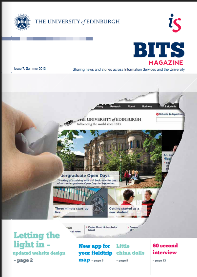We have great pleasure in welcoming a new member of staff to the research data management programme. Kerry Miller has joined us in the role of Research Data Management Service Coordinator.

Kerry is featured in the latest BITS magazine, sharing details of her new role:
What’s your background?
I’ve undertaken research for various organisations, in industry and charity sectors –
including what is now GlaxoSmithKline and Cancer Research UK as well as the
Ministry of Defence and the British Council. I then joined the Digital Curation
Centre (DCC) in 2011 as an Institutional Support Officer. This involved working
with Higher Education institutions across the UK to help them improve their
Research Data Management policy and practice, in response to Research
Councils UK and other similar requirements.
Tell us about the new position.
My new post, RDM Service Co-ordinator, is a newly-created post, aiming to
bring together and co-ordinate all the different aspects of the research data
management work that’s currently being undertaken throughout the University: lots of
infrastructure improvements, and new tools and support for researchers. There
are things like DataShare, which has been active for a while now, but which we’re
promoting, so more researchers are aware of it and know when to use it. There
are also a few more services that are still in the design phases. You can read all
about the RDM work that is going on via the RDM Blog: datablog.is.ed.ac.uk
What particularly excites you about the new role?
The work we do at the DCC is in many ways quite theoretical; we go out and talk
to institutions about what they ought to be doing, what they need to do to meet
requirements, and that sort of thing, but this new role will be going from talking
the talk to walking the walk; I’ve got to actually do what I’ve been telling people at
other institutions to do! It’s quite scary but also quite exciting; just to see whether
or not I can actually turn that into a real, successful service.
Where exactly will you be based?
I’m within the Research and Learning Section of Library & University Collections, on the lower ground floor of the Main Library. There is a huge number of people involved in the area, but the RDM team itself is small and there aren’t that many people full-time at the moment. RDM is part of a lot of people’s jobs – people like Stuart Lewis and John Scally from the library side, Tony Weir in IT Infrastructure and Robin Rice in the Data Library, but I’ll be one of the few people for whom it’s a full-time, dedicated role.
What do you enjoy doing outside work?
I watch a lot of films, and do a lot of cooking and baking. I’ve been doing a recipe
a week from The Great British Bake Off, with greater or lesser success. I often use
my office colleagues as a waste disposal system!



 As published in
As published in